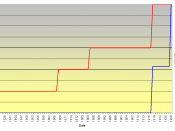The role of the British government was greatly expanded during the industrial revolution moving through the three stages of laissez faire to liberalism then progressing towards socialism. Overall, these political shifts were fuelled by a growing sense of morality within the middle class and their interest in politics, new ideologies - including the concept of equality, a clear need for government order within a rapidly changing and populous society, fear of revolution created by circumstances in France and public pressure from an increasingly expanded franchise. The combination of these factors led to the recognition of the necessity for increased government involvement and political reform in all areas of society, in particular those of suffrage, welfare and parliamentary structure.
In addition to the formation of an exploited working class during the industrial revolution, there was a prominent emergence of an educated middle class. This educated middle class took an interest in politics and was driven strongly by a new sense of morality, stemming from the Christian religion.
In the instance of the Corn Laws of 1804 which were deemed unjust towards the townsfolk, a major political campaign ensued, involving petition drives supported by merchants, industrialists, and the middle class which finally caused the Laws to be repealed. The repeal of the Corn Laws caused a large political impact because it exemplified the shift in political power from the aristocracy to the middle class. This class began to pervade parliamentary proceedings imposing their values of morality through parliament and politics onto the working classes, which resulted in political reform and government involvement particularly in regards to working conditions for women and children. In due course, the rising power of the middle class would change parliamentary structure itself. This was seen in the Parliament Act of 1911* in which the House of...


